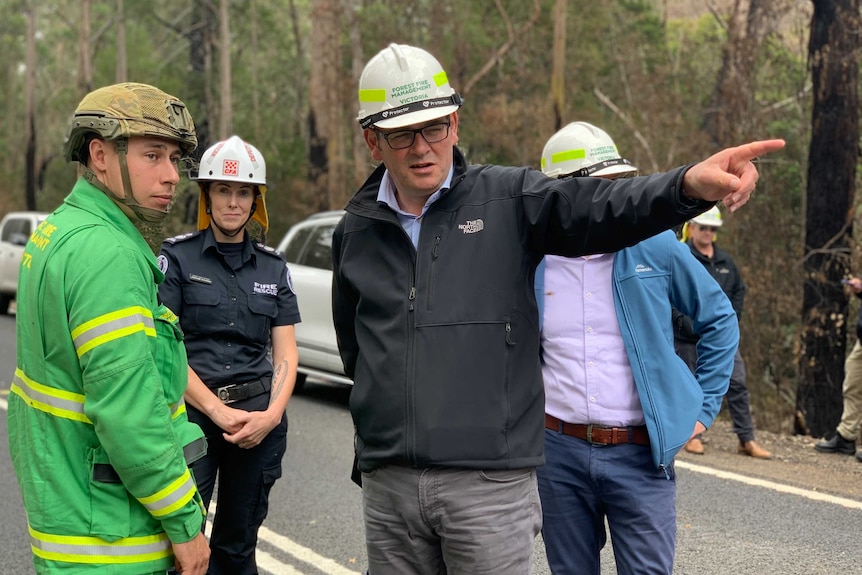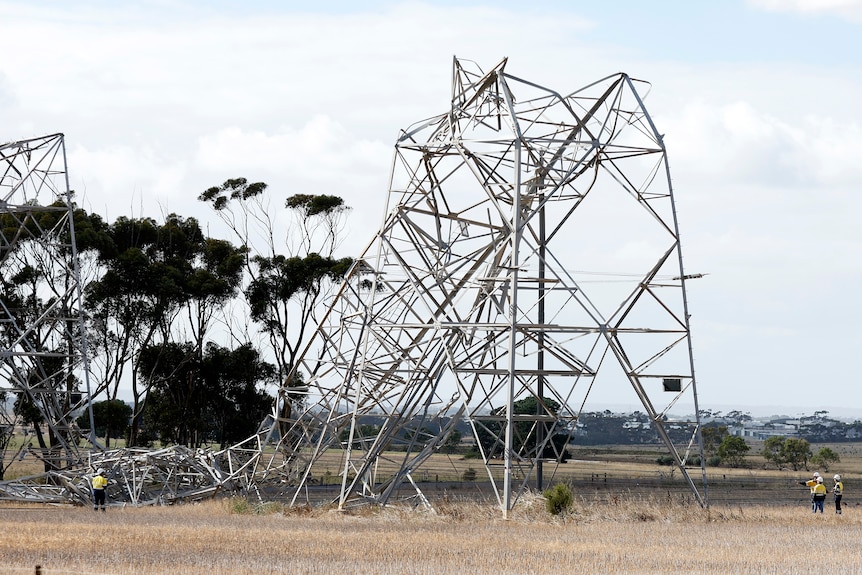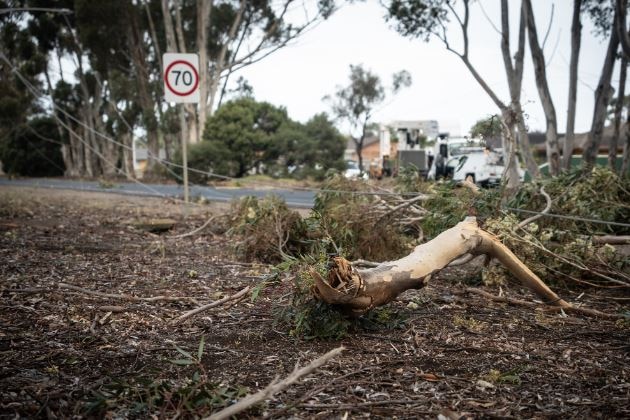Daniel Andrews Leadership Style During Crisis
Daniel Andrews’s choice of a North Face jacket served as a clear indicator of his readiness to tackle challenges. It symbolized his shift into disaster management mode.
Throughout his extensive nine-year term, Daniel Andrews encountered a series of crises, including COVID-19, bushfires, floods, and drought.
During these tumultuous times, Andrews consistently took charge, demonstrating his proactive leadership style by swiftly addressing issues and guiding the state with determination.
Despite potential disagreements with some Victorians over his decisions, Daniel Andrews executed his policies with the conviction and decisiveness expected of a true leader.

Former premier Daniel Andrews was present in the fire zone back in January 2020, just weeks before the onset of the pandemic. This week’s tumult of bushfires, severe winds, and unprecedented blackouts has placed Jacinta Allan in her first true disaster trial. The task at hand for Allan is two-fold. Firstly, she must address the immediate cleanup efforts and restore power. Secondly, she must navigate voter concerns regarding energy policy and security, which will be discussed further. Jacinta Allan found herself dealing with bushfires and storms simultaneously on opposite ends of the state. This week served as an opportunity for the premier to showcase her identity and the type of leader she aspires to be. With the double disasters drawing attention to her, she had a more captive audience than usual, with many Victorians tuning in to her for the first time. Allan made her way to the Grampians on Wednesday and stayed there through Thursday, visiting fire-ravaged communities in Pomonal and Dadswells Bridge, where numerous properties were destroyed. She also traveled to Mirboo North, a Gippsland town severely impacted by the deadly storms. Jacinta Allan’s compassionate nature has been highlighted. Despite the challenging circumstances, reports from the field indicate that the premier, who hails from the countryside, was at ease in the environment, with her warmth being a valuable asset. During a press conference where a resident expressed frustration over the lack of mobile coverage, Allan attentively listened and acknowledged the concern, both on and off camera. A senior government official remarked, “For her, it is so natural. It’s who she is.” Allan’s genuine warmth shines through, particularly outside the realm of TV press conferences.
Daniel Andrews Leadership Style Put to the Test
However, more significant challenges lie ahead that may shape the trajectory of her administration over the next three years.
It is imperative for Allan and her team to instill confidence in the public regarding the stability of the energy grid, particularly as the state transitions from coal to renewable energy sources.

Labor is working diligently to prevent the government from being destabilized by the recent massive power outage, as reported by AAP’s Con Chronis.
Daniel Andrews Leadership Style and Energy Policy
The government has set ambitious goals, aiming for 65 percent of our energy to be sourced from renewables by the end of the decade. However, this week saw a different scenario, with two-thirds of the power coming from brown coal, 13 percent from gas, 15 percent from solar, and nine percent from wind.
Tuesday’s power failures were not due to energy production issues but were a result of severe storms that wreaked havoc on power lines across the state. Nevertheless, this incident has brought the complex realm of energy policy and politics into sharp focus.
Ensuring a stable power supply is a fundamental responsibility of the government, even within a privatized system. When power outages occur, constituents demand accountability.
The intensification of storms like the one on Tuesday, attributed to climate change, will continue to strain aging infrastructure. The collapse of six large transmission towers during the storm, constructed under outdated specifications, highlights the vulnerability of hundreds of similar structures across the state.
This situation underscores the significance of energy policy as a critical challenge for a government seeking a historic fourth term in 2026. While weather conditions play a role in power line disruptions, repeated incidents may lead voters to question the government’s preparedness.
Pollster and former Liberal Party strategist Tony Barry emphasizes that energy policy is a sleeper issue for the government as the next election approaches. He warns that if the government fails to address energy policy challenges, such as ensuring a reliable energy supply, they risk facing political consequences in 2026.
According to Mr. Barry, the success of infrastructure projects overseen by Jacinta Allan during the current election cycle may lose significance if Victorians continue to experience frequent blackouts or escalating energy costs due to government shortcomings in grid supply delivery.
Failure to address energy policy inertia could potentially have severe political repercussions for the government in 2026.
Daniel Andrews Leadership Style: A Key Factor in Overcoming Transition Trepidation
Mr. Barry highlights that despite the enduring popularity of rooftop solar, research indicates a significant level of skepticism regarding the progress of renewable energy projects.
“While the government visibly invests in road, tunnel, and rail infrastructure, the lack of tangible evidence of commitment to renewable energy is a cause for concern among voters,” he emphasized.
This perception leads voters to question the government’s dedication to addressing climate change, a pressing issue for many, although overshadowed by concerns about the cost of living.
Years of political discord over climate policies have hindered Australia’s advancement in renewable energy investment. However, the Andrews-Allan government has a clear policy agenda in place.
Setting ambitious energy and emission targets, the government has also revitalized the State Electricity Commission, enabling the state to financially support new energy generation initiatives.

Daniel Andrews Leadership Style and Energy Reliability in Victoria
When Victoria heads to the polls next, energy reliability is poised to become a critical issue. The long-term nature of energy policy means that the development of generation and transmission projects, as well as the reduction of household bills, requires significant time and effort. This complexity adds a layer of challenge to the political landscape.
According to energy expert Tony Wood from the Grattan Institute, the imperative to address climate change necessitates a shift in our energy mix. However, the Allan government is currently lacking a clear and coherent narrative regarding this transition.
“In order to garner support, the government must craft a compelling story that resonates with the public,” remarked Mr. Wood.
Victoria has been actively constructing new solar and wind farms throughout the state, a crucial step in diversifying power sources. Despite this progress, these initiatives have not captured the attention of voters to the same extent as projects like level crossing removals or the metro tunnel.
This shift towards renewable energy sources also underscores the need for expanded transmission infrastructure. However, this expansion presents a challenge in terms of gaining community acceptance, particularly in rural areas where opposition to new transmission lines is on the rise.
Navigating the delicate balance between constructing vital infrastructure that shapes the nation’s future and addressing the concerns of local communities poses a significant challenge for any government.
Impact of Blackouts on Daniel Andrews Leadership Style
Recent storms have raised concerns within the community regarding the reliability of the extensive network of privately operated power lines.
There are suggestions to relocate power lines underground; however, the associated costs are exorbitant and unaffordable, ultimately burdening households with substantial expenses. Despite being under private ownership, state governments are likely to bear the brunt of public dissatisfaction.
This situation poses yet another obstacle for Daniel Andrews’ leadership style.

Daniel Andrews Leadership Style in the Midst of Energy Challenges
The recent storms and subsequent record power blackout have sparked concerns regarding the impending ban on gas in Victoria, as reported by ABC News’ Matt Brown.
Amidst the blackouts, attention has been drawn to the future of gas in the state. Victoria has taken steps to prohibit new household gas connections and has outlined a plan to decrease the consumption of this fossil fuel.
“Gas plays a significant role in Victoria,” emphasizes Mr. Wood, highlighting its importance during the transition to alternative energy sources.
Victoria currently has two million homes and businesses reliant on gas, the highest number compared to other states. While historically affordable and vital for powering the state’s economy, gas reserves are depleting, leading to escalating prices.
To meet emission reduction goals, Victoria must lessen its dependence on gas in households and businesses.
However, persuading the public to make this shift requires additional incentives, cautions Mr. Wood.
Opponents of the Labor party have already initiated campaigns against the removal of gas as a household fuel, causing unease among some Labor MPs and ministers.
Ensuring a stable power supply is a crucial responsibility of the government. With the likelihood of such storms increasing in frequency and intensity, there will be ongoing discussions and challenges.
Amidst these circumstances, there is an opening for the opposition to focus on energy-related issues.
During the recent storms, the opposition swiftly demanded answers, showcasing old-school political tactics that may not resonate well with voters seeking constructive engagement during turbulent times.
Despite this, there remains a vulnerability that could be exploited, especially if similar challenges arise in the future.
As the winds of change blow fiercely, it will require more than just symbolic gestures and empathetic words to reassure voters, particularly in an election year.
For more insights on leadership styles and current affairs, please visit our site 60time.com. Don’t forget to follow us on social media for the latest updates, find us on Instagram at @60time.com.



